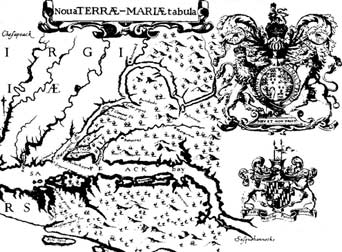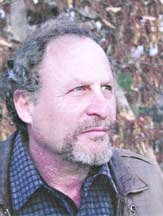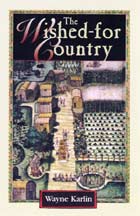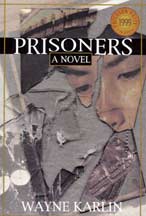|
Chesapeake Stories for Maryland Day
Back to Maryland’s Beginning
Chesapeake Country Author Wayne Karlin Imagines
the ‘Wished-for Country’
by Sara Ebenreck

Wayne Karlin, author of an intensely dramatic novel about the English colony at St. Mary’s City, says that when he first read that line by White, he realized that the wished-for country would make a great title for a book.
Other books intervened.
One, Prisoners — which won the 1999 Paterson Prize for fiction — is just as local. During the Civil War, over 30,000 Confederate prisoners were held at Point Lookout, where the Potomac flows into Chesapeake Bay. Its action links 19th and 20th centuries by moving between the search for a young orphaned Vietnamese girl and scenes from the wartime prison camp, held together through the mist of time by historical ties between members of the 20th century search party and their ancestors, who lived as prisoners or guards.
The juxtapositions fit the atmosphere of Southern Maryland, where the pain of the Civil War is still alive in family memories and where the highway moves a traveler abruptly from the workplaces of 21st century warriors (and consultants) to monuments of the past.
Then in mid-2002, the wished-for novel hit the press to immediate acclaim. “Karlin has … given voice to people who are usually left mute,” said The Washington Post review. “At the end of the novel, readers will be in awe, minds on fire, forever changed by how we view our nation’s colonial history,” raved the literary magazine The Bloomsbury Review. “Karlin turns the stereotypes of colonial America upside down,” said Publisher’s Weekly.
Set in and around colonial St. Mary’s City, Maryland, The Wished-for Country explores the interactions of characters usually in the shadow of the well-known figures of that history: Leonard Calvert, Margaret Brent and Father Andrew White.
Speaking of his story in his simple but art-filled home only a couple miles landward from the 1634 landing of the Arc and the Dove, Wayne Karlin is both quiet in voice and fiercely reflective.
White’s words started him into new awareness, he says.
“White just didn’t see that there were already names here, because there was no legitimacy for those native names.” St. Clement’s Island, St. George’s, St. Mary’s: the new names proliferated, marking the places as English.
Nor did the new Marylanders seem to see the inherent contradiction of purchased slaves with their commitment to a new freedom “that would throw off the shackles of the past,” Karlin says.
White chronicled the mutilation and hanging of a slave ready to lead a revolt in Barbados, remarking that it was divine providence that, by the betrayal and execution of the slave, saved the English adventurers from losing their ships to the rebellion.
“It’s not that White was a bad man,” Karlin says. “He was struggling with many new experiences and he has a blindness. Yet here was an African slave who wanted freedom, who had been mutilated and hung for that.”
Instead of disappearing forever on the shoreline where he had been hanged, the image of that slave opens Karlin’s novel. The slave who betrayed him, taking Ezekial’s name, becomes a main character in the book.
For this 21st century author, writing about the new Maryland colony provided, he says, “a metaphor for America, where you find great potential, ideals and goodness — and also all the things that hold those potentials back.”
Weighty ideas for a historical novel. Yet the Baltimore Sun reviewer writes, “The book delivers.”
What it delivers — along with the historically accurate voice of Andrew White and several others of the period — are the imagined voices of the forgotten: James Hallam, indentured carpenter; Ezekiel, the African slave brought to Maryland from Barbados; Tawzin, a Piscataway Indian of the ruling family; Jacob Lombroso, a mystic Jewish physician who had been refused a freehold in the colony; Wesort, a stolen, then rescued, white woman who gives her name to the community that begins to form among those living on the edges of accepted colonial society; the Hawk, who sees far in advance what will happen to the Chesapeake forests and waters.
What it gives us are voices that shift the reader’s ideas of what Maryland, and America, have been — and are.
 |
|
photo by Roger Horn
|
Who Is Wayne Karlin?
A savvy city kid, he says, who grew up on the humanly intense New York island.
A Vietnam veteran now called “one of the most gifted writers to emerge from the Vietnam War.”
A former Marine helicopter gunner who in 1993 met a North Vietnamese woman writer and discovered that she had been in the jungle below his helicopter, repairing bomb damage to the Ho Chi Minh Trail. A veteran who learned that killing in war “has to involve disrespect for the humanity, the viewpoint and the history and cultures of others when all that becomes inconvenient for the way we want to shape the world.”
A Southern Marylander (since 1984) who hauls his kayak into a run near Leonardtown, moving from the world of golden arches to “an old tree forest with wildlife that opens into marsh filled with fish and heron — where the human world disappears.” A writer who walks into the Battle Creek Cypress Swamp in Calvert County, listens to the silence and shifts into the consciousness of a 17th century character in his novel, becoming aware of how “all-pervading” the place would seem.
A graduate of American College in Jerusalem and holder of a degree in creative writing from Goddard College who then translated and edited writing by that former Viet Cong ‘enemy.’ A passionate believer in hearing a diversity of voices.
A lover of writing that opens windows into other’s consciousness.
A teacher of literature and creative writing at the College of Southern Maryland who does workshops and readings at other colleges in the area. A teacher who thinks that “the only way we’ve moved [out of flawed ways of thinking] is by paying attention, by recognizing the contradictions between the ideal and the reality.”
A writer who presents the voices of his characters without comment on them, who writes of the dark side of life and also of hope and love-filled moments, leaving the reader to draw conclusions, to develop the capacity to see.
A very demanding writer; a writer of great gifts.
Home Truths
“Part of the problem of seeing a place as something to be shaped to your own greed is that you lack respect for the place itself,” Karlin says. “That attitude is embodied in Hallam. The hawk looks at Hallam and shudders. And that attitude is one of the regional problems that we’re still struggling with: over-development instead of preservation of place.”
Karlin came to Southern Maryland before the big chain stores and the ex-urbanization of huge tracts of its land — “before the southern counties moved from fishing and carving to high-tech military,” he says.
His family moved, he says, “from a place that was all-mall. But this morning, here, I went out with my dog and the ducks were coming over … it’s terrific. It’s not yet all gone.”
Experiencing nature helps Karlin feel whole. “We need to keep asking,” he says, “what’s left that will refresh my soul that’s unique, that can give me a sense of the character of this place that I want to love and respect?”
As a writer as well as a citizen, Karlin values this wished-for land. “I’m a writer and I love stories,” he says. “Stories come out of unique personalities … and they existed in a place like this, that wasn’t yet homogenized.”
 Preservation and human presence are not for Karlin an either-or choice. He says he finds a point of balance in “a way of living that values diverse perspectives and uses other criteria than ‘the most and quickest profit’ in making decisions. Preservation and human presence are not for Karlin an either-or choice. He says he finds a point of balance in “a way of living that values diverse perspectives and uses other criteria than ‘the most and quickest profit’ in making decisions.
“The American way of living is often interpreted as the freedom to get rich, but there is this other path of freedom that includes respect for others around you and the place you’re in.”
The community of Wesorts in his novel embodies this way of living. Driven together by survival needs, by empathy and — in two cases — by the love of a woman and man for each other, the Wesorts take their name from the phrase “we sort of people.” All are outcasts, but also people living by choice on an edge between colonial groups — themselves in competition with each other — and the native Piscataway or Susquehannocks. Wesorts include black and white, native, Jewish, Christian and agnostic.
Remnants of the Wesort culture exist to this day; Karlin says he’s met a few.
The reality of Wesorts merges with fictional personalities and ideas that are, apparently, some of both. Past and present mix. Events in the book — what happens when two religions and cultures confront each other — illumine events on the planet today. There is no master narrator of this vision; every character in the book has his or her own voice.
 And in this novel, everyone’s voice is a song. And in this novel, everyone’s voice is a song.
“Before all the oldest stories were written, they were sung,” the author muses. Now, in his book, scene after scene opens as Hallam’s Song or Tawzin’s Song or Wesort’s Song. “I envisioned the songs by imagining the Wesorts in their circle, and they’re singing their history in a very oral tradition kind of way,” Karlin says. “So the book is singing their history.”
The song of Wesort — both the woman and the community that takes its name after hers — is the last in the book. Listen to some of the words:
“All the songs are still here, singing us the paths we must take to live in this new world we have all crossed into, born out of murder and ashes and hope, this place of binding and dissolution, this small clearing we hold onto tight as love in the true world of our dreams.”
The Wished for Country is a book that leads readers into asking: What is the song that my life creates?
And to ask: What other songs do I hear? Song of water, wind, forest? Song of turtle, crow, heron? Songs of the forgotten, the usually invisible?
What songs do I love and pass on?
And there you are — in the community of the book!
- On April 3, Wayne Karlin reads from his book at 8:15pm at Daugherty-Palmer Commons, St. Mary’s College of Maryland: www.smcm.edu/events.
- Reach Karlin at the Languages and Literature Department of the College of Southern Maryland: www.csm.cc.md.us.
Books by Wayne Karlin
Find summaries at Curbstone Press: www.curbstone.org.
| About the Author: Sara Ebenreck is project director for Chestory: The Center for the Chesapeake Story. Formerly a teacher of philosophy at St. Mary’s College of Maryland and editor of American Land Forum magazine, she taught environmental ethics and was first coordinator of the multi-disciplinary environmental studies program at the college. Among other publications, she is author of “Water’s Story, Our Story” in the Summer 2001 issue of Potomac Review and co-editor of Water, a collection of writings about water by Southern Marylanders aged nine to 90. |
 |
|




 Preservation and human presence are not for Karlin an either-or choice. He says he finds a point of balance in “a way of living that values diverse perspectives and uses other criteria than ‘the most and quickest profit’ in making decisions.
Preservation and human presence are not for Karlin an either-or choice. He says he finds a point of balance in “a way of living that values diverse perspectives and uses other criteria than ‘the most and quickest profit’ in making decisions.  And in this novel, everyone’s voice is a song.
And in this novel, everyone’s voice is a song.